- Home
- Priscilla Royal
Wild Justice Page 20
Wild Justice Read online
Page 20
“Stand up, Father,” Prioress Amicia said. “I freely give forgiveness. In my confinement, you offered consolation. In the pain of my ill-health, you brought balm to my soul. If you sinned, it was because you suffered a failure of reason, one that I sinfully abetted. The nuns also came to the same conclusion about my guilt and may well have done so even if you had not said what you did. We are all flawed creatures, a fact we often forget in our worldly arrogance. So I feel no malice toward you and ask no penance other than what your own confessor orders. You have told me why you argued as you did, begged my forgiveness, and that is sufficient to me.” She gestured for him to step aside.
Brother Damian leapt to his feet, holding his stump and grimacing with pain. “You know my sin, Prioress Amicia, as does my sister. Before we knew of Janeta’s guilt, I confessed it all to the now Sister Emelyne, thus I need not speak of it again.” Looking over his shoulder, he glowered at Prioress Eleanor just behind him. “Especially in public.”
Eleanor raised an eyebrow but said nothing.
With an expression of disgust, Sister Emelyne watched her elder sibling bluster.
Spinning around, he pointed at Prioress Amicia. “You tolerated it,” he said to her and shook his finger.
She remained utterly still for a long time
Sweat beaded on his forehead. His hand fell to his side.
Finally, she answered. “You are a wrathful, arrogant man, Brother Damian, but you are also as weak as frayed cloth. Yes, I tolerated your embezzlement of priory funds for a time. In that, I bear great blame. But lest you think no one else knew of your cowardice in Outremer, I must now tell you that my husband told many others of it, not just Mistress Hursel, when he drank too much at table. He even boasted to me of how swiftly he cut off your hand.”
Damian cried out in agony and collapsed on the floor.
Father Pasche rushed to his side, but the man waved him away and began to weep.
“Yet I knew that your wound caused you much agony and believed that was penance enough for fleeing battle. It was weak of me, but I also grieved that you, or anyone, should fall victim to my husband and Mistress Hursel who were creatures much beloved by the Prince of Darkness. For that, I erred in judgment and chose to hide your theft.”
Damian gripped his stump and whimpered.
Eleanor wondered if his cries were due less to the pain in his arm and more to the realization than everyone now knew about his crime against the Order and his personal shame.
“As I must soon face God, I shall forgive all your sins against me. What is not mine to forgive is your willingness to let any innocent person be found guilty so your own sins might remain hidden.”
He waved piteously at her, begging to be heard.
“I do not wish to hear your feeble excuses, Brother. Had another stood in my place, knowing what I did about your shame and guilt, I believe that you would have found some cruel way to silence him.”
“Not murder!” he howled.
“Only your soul and God know that.” She placed her hand on a document that lay next to Prioress Emelyne’s confession. “Nor have I the right to forgive you for stealing from the Order and denying our hospitals all the funds needed to heal the sick. I have therefore written the details of your theft to our Prior and fully explained my reasons and part in hiding it. Both these messages will be sent this day to Clerkenwell.”
“Please, my lady! No! I plead for clemency!” Tears flooded his cheeks, and he banged his head on the floor.
“You received leniency a long time ago, Brother Damian, and abused the charity,” she replied. “Father Pasche?”
The priest stepped forward.
“Take this man back to his chamber in the commandery. Lock the door and set a guard. That shall become his prison until the Prior renders his verdict. But treat him kindly and allow Sister Richolda to provide him with the medicine required to ease the pain of his physical wound.” Sadness briefly flickered in her eyes. “I know you will do all you can to treat his spiritual ones.”
Firmly but gently, the priest pulled Brother Damian to his feet and pushed him out the door.
Prioress Amicia gave Sister Emelyne permission to follow and give comfort to her distraught brother, if she so desired.
Then she looked at Prioress Eleanor. “If you will, please shut the door,” she said a voice that was suddenly humble and slightly pleading. “I beg that you remain alone with me for just a short while longer. Although I know you will begin your journey back to your priory today, it would be a kindness. There is something I must tell you.”
“Of course,” Eleanor replied, a bit perplexed. After all that had happened and been said in these tragic matters, she could not imagine what more there could possibly be left to tell.
Chapter Thirty-nine
When Eleanor turned around after shutting the door, she saw that Prioress Amicia was now seated on her cot.
“Please join me here,” she said. Her demeanor had softened, her smile was warm, but profound weariness had finally conquered her ability to hide frailty. “I no longer have the strength to stand, and looking up wearies me beyond endurance.”
As she sat beside her, Eleanor reached out for the woman’s hand. It was dry as parchment and cold as stone. Death stands very near to her indeed, she thought, and begged God to be gentle in those hours when the woman’s soul struggled for release.
“I will keep my promise not to delay your departure, but I have a confession to make that only you and God must hear in this place.”
Eleanor nodded. In ways, Prioress Amicia reminded her of her dead aunt, Sister Beatrice, and that calmed her. Yet she knew her guilt over failing to save Janeta and the lost babe were only set aside and would return to haunt her soon enough.
“I know you wonder why I refused to declare my innocence until you came to speak with me. On my deathbed, I would have confessed my innocence. But when I was accused and saw the expression on Janeta’s face, I knew she had killed Mistress Hursel. I had already suspected she was with child. And thus I allowed the blame to be placed on me. I am dying and wicked enough. In that instant, I decided my soul could not be any darker if it had one more festering sin, and that lie was a little enough transgression.”
“You would have let her escape all consequences for her crimes?” Eleanor said this in a sharp tone, then realized her words betrayed a rigid arrogance born out of her own failures and had little to do with Janeta’s sins. “Forgive me for those harsh words. I want to understand and have no right to condemn.”
Amicia dismissed the need for apology. “You think she would have suffered no consequences for killing Mistress Hursel? Let me ask you this. What can a young woman of her rank do with a bastard child at her breast but without kin or mistress? Beg in the streets?”
“For a woman that usually leads to whoring.”
“And to some that is a fouler sin than lying once with a man, even one who has sworn to be chaste.” Her eyes shut for an instant. “And her babe? The Hospitallers might well have taken it to raise, but she would never have seen her child again. That is a grief far more painful than this canker that will soon kill me.”
“But she killed Brother Martin.”
“And I blame myself for that. Had I spoken to Prioress Emelyne earlier about offering the security of a place here, even though Janeta would have had to surrender her child, that death would have been avoided. And if I had spoken frankly with Janeta as well…” Her voice trembled.
Eleanor knew she was struggling with her next words.
“As you heard me say earlier, Janeta is a murderer and, perhaps, an unrepentant one. Yet I confess I might have forgiven her for the death of Mistress Hursel, as many others did in fact. That is a mortal’s selfish rationale, for we must ask if anyone but God has the right to kill another, even justly.”
“I share your doubts.”
“As for the de
ath of the young lay brother? When my guard was dismissed, and I first learned of Brother Martin’s death and cause, I had neither reason nor right to forgive that crime. Yet I do take the sin of Brother Martin’s murder on myself as well because my ill-conceived decisions and failure to properly guide led to it. I shall add that transgression to my deathbed confession.”
As Amicia caught her breath, Eleanor felt something far more chilling was coming.
“By now, you have heard the rumor that I killed my husband?”
“I have.” Eleanor’s voice did not betray her unease.
“The story is true.”
Amicia nodded at their joined hands. “You did not withdraw your hand, and your eyes do not condemn me,” she said. “You continue to listen, yet have not rendered judgment.”
“Truth is rarely as simple as men claim,” Eleanor replied. “I cannot swear that I will not judge, only that I will hear, with an open heart, all you have to say in this matter.”
“My husband and I never found joy in each other. I gave him no children. He gave me little courtesy. As men, whether good or evil, often do, he found other women to bed, mostly servants, yet did not even father bastards for me to raise. When he could, he went to war. When he could not, he reveled in wine.” She rubbed her fingers under her eyes.
Eleanor saw no hint of tears.
“After too many cups, he became violent and, for my barrenness, would sometimes beat me.” She looked away. “Out of mercy, some of his men took pity on me and tried, most nights, to lead him to a whore or a bed where he usually fell asleep. But one evening, after he had returned from Outremer, he escaped his fellows and sought me out, dragging me from my bed by my hair. At the top of the stairs, he pulled me to my feet, then struck me until I bled and earned this scar where his ring cut my lips.”
“Dear God,” Eleanor whispered.
Amicia’s voice dropped to a whisper, her gaze becoming distant as if seeing it all again. “I don’t know why he released me. He was screaming and then lunged at me. I stepped aside.” She took her hand from Eleanor’s and pointed to the left. “He fell, headfirst, down the stairs.” She gestured downward, her expressionless eyes staring. “It was so silent. His body lay awkwardly at the bottom of the stone steps. I knew he was dead.”
She glanced at Eleanor as if still amazed by what had happened.
Neither said a word.
Tears slipped down her cheeks. “Even now,” Amicia murmured, “I avoid the whole truth. As he fell, his hand reached out. I stepped away. Had I taken his hand, perhaps his fall would have been broken and my husband might have lived. But I denied him that mercy, and thus I am guilty of his death.”
“He might not have lived, or more likely taken you to your own death with him,” Eleanor replied.
“I did not even try,” Amicia said. “For that, I own guilt.”
Eleanor could not so easily condemn, although she was beginning to understand why Amicia had been inclined to forgive Janeta for the murder of the butcher’s widow. “Did Mistress Hursel witness this?”
“She saw the corpse, looked up, and observed me standing there. When the sheriff arrived, my husband’s guests that night said he had drunk deeply, as was his custom, and brought no blame on me. Indeed, his very sweat stank of wine. One swore he had seen me come late to the staircase and vouched for my horror and grief at the sight of the corpse.”
Eleanor nodded. Out of sympathy, those who knew how brutally a husband beat his wife often did their best to protect her from any suspicion should he fall victim to a questionable accident.
“Mistress Hursel later asked for money to keep her silence. I told her that she had no proof and dismissed her from my service. As for Janeta, she saw nothing that night but later bathed my wounds with kind gentleness.” Amicia put one hand on her breast. “I confessed my sins to my priest, a man who chose mercy, and then I begged the Prior of England to let me take vows. Soon after, I donned this shirt of thorns in penance for killing my husband.”
“Father Pasche was here when you arrived.”
“We have never spoken of his brother’s death, yet I realized during my trial that he must have heard the rumors when he spoke so fiercely against me. But he was kind to me after my conviction, and I do not blame him for concluding I could have killed Mistress Hursel if I had also murdered his brother.”
“And because you believe you are guilty of your husband’s death, yet you had found a priest who offered forgiveness, you were willing to excuse Janeta’s murder of Mistress Hursel?”
“Mistress Hursel lived in the Devil’s heart. She could not destroy me. Of what value is the word of a servant when men of rank swear she is wrong? As for Brother Damian, he is a weak and craven man, yet my husband had already delivered to him a savage justice for his cowardice. What right had Mistress Hursel to extort money when he had paid the price for his transgression? And she has done far more to others. I could not see Janeta condemned for sending this woman’s soul back to Hell.”
Eleanor wanted to argue but was not up to the debate. Janeta was dead. Her soul was facing God. Whether or not she was satisfied with Prioress Amicia’s logic, she believed there would be justice in accordance with God’s law for both Janeta and the butcher’s widow.
Her thoughts were interrupted as she felt Amicia press something into her hand. She looked at her palm and saw the ring Sister Anne had found in the garth.
“In time, and if you deem the circumstances right, I beg you to give this ring to your nephew, Richard FitzHugh. When you do, and only if you feel it wise, tell him that his mother never ceased to love him and that I begged God, with my last breath, to guide and protect him.”
Chapter Forty
Eleanor was speechless.
The dying woman gently closed her companion’s hand over the ring. “Your brother gave me that ring when our son was born. May God forgive me, but I have never repented the gift or the reason it was given.”
This, Eleanor thought, is why you forgave Janeta so much. You understood what she must face when she was forced to surrender her child.
“Your brother is a kind man. He saw my wounds and learned how my husband beat me. Indeed, when he visited us, he tried to protect me from the blows. After my husband left to fight the Infidel, Hugh’s comfort and my longing for it led us to bed many times. When I quickened with child, he promised to send me to a remote manor house where I might give birth in secret. The women in attendance were skilled and gentle. Your brother was present and welcomed the babe with joy.”
“He has never spoken of this.”
She smiled. “Yet he has raised Richard as if he had been born of a lawful marriage and regularly sent me news. Not long ago, he told me that Richard had chosen to serve the king in matters of the law.”
“I had hoped he would become a priest,” Eleanor replied. “I confess it.”
“A man can serve God without taking vows and serve his king without taking up a sword.” Looking at her companion’s expression, she laughed but the sound was far weaker than it had been. “Yes, he told me how you and he had argued over that. I praised your wisdom in suggesting the boy go to Oxford and choose his own way.”
“I did not even know your name,” Eleanor said quietly as she carefully stored the ring in her pouch.
Prioress Amicia suddenly bent forward and groaned.
Eleanor hugged her gently and comforted her. “You are weary,” she said, feeling each bone in Amicia’s body through the thin flesh that barely covered them.
“And shall die very soon,” the woman said and forced herself to sit up once again. “I have but little more to say, and then you must leave.”
Eleanor told Amicia that she regretted she had not met her until now, yet appreciated why Hugh had kept the secret.
“And I kept one from him. Only this one. The reason my husband beat me with such severity the nig
ht he died is because he had learned of my adultery. He did not know of the child I bore. Had he, he might well have killed me. But I knew who must have told him about my infidelity, and I have struggled to banish my hatred for Mistress Hursel. Will you swear never to tell your brother that? He would not forgive himself for the harm done to me, and he owns no fault in what happened that night.”
Although she wished it could be otherwise, Eleanor gave her oath to remain silent.
“After my husband’s death, your brother wished to marry me so we could raise our son together. I refused, confessing my crime that caused my husband’s death. I said I must take vows to atone. He grieved over my decision but understood.”
And none of us knew any of this, Eleanor thought. Or did our father? She doubted it. Perhaps Hugh would have told him if Amicia had agreed to marriage.
“Not long ago, I sent him word that I was dying. His reply was the letter you brought. In it, he said he was going to fight the Welsh under our king and might die as well. He begged me to tell you the truth of our son’s birth so you might decide whether to tell Richard the story, how much to tell, or when. Someone must know it, he said, and you were the one person he trusted without question to make the right decisions.”
Eleanor swallowed stinging tears.
“When I read his letter, I knew I could not die, convicted of a murder I did not commit. That my son might someday learn that his mother, had she not taken vows and died of this canker, would have been hanged was more than I could bear.”
Struggling to keep her emotions in control, Eleanor simply nodded.
“I knew the evidence against me was weak. If only I had responded with the outrage of an innocent woman, Father Pasche would not have set himself against me, and the others concurred for their own reasons. Instead, I suggested guilt by my refusal to say I had done nothing. I only prayed that you expose the conviction as inadequate and inform the Prior of England. As for Janeta, I knew it was unlikely that her guilt would be found out. What evidence was there that pointed to anyone?” She gazed sadly at Eleanor. “I was aware of your reputation but should have known better than to assume you would not uncover the whole truth.”

 The Twice-Hanged Man
The Twice-Hanged Man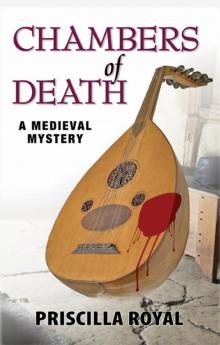 Chambers of Death mm-6
Chambers of Death mm-6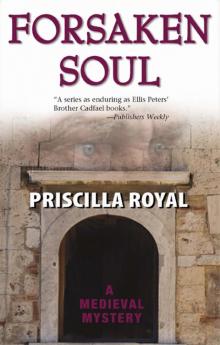 Forsaken Soul
Forsaken Soul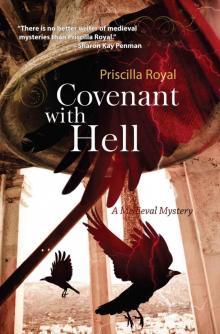 Covenant With Hell (Medieval Mysteries)
Covenant With Hell (Medieval Mysteries)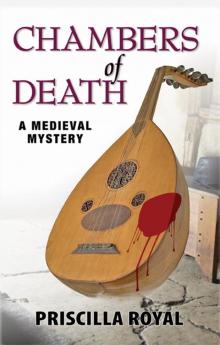 Chambers of Death
Chambers of Death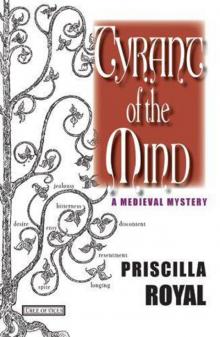 Tyrant of the Mind
Tyrant of the Mind Wild Justice
Wild Justice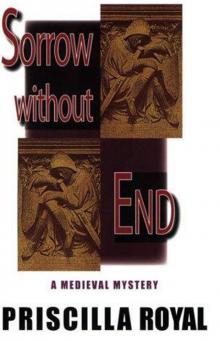 Sorrow Without End
Sorrow Without End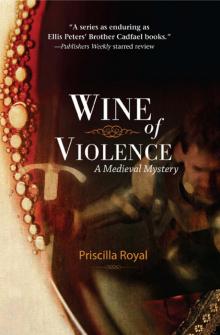 Wine of Violence
Wine of Violence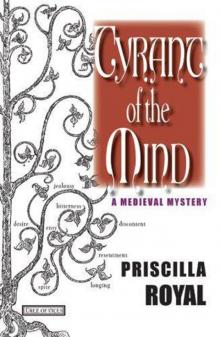 Tyrant of the Mind mm-2
Tyrant of the Mind mm-2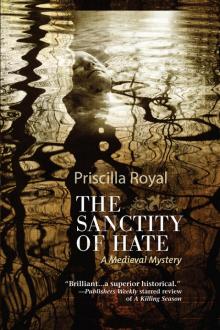 The Sanctity of Hate
The Sanctity of Hate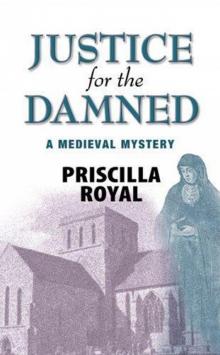 Justice for the Damned
Justice for the Damned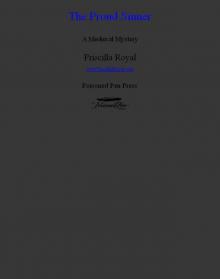 The Proud Sinner
The Proud Sinner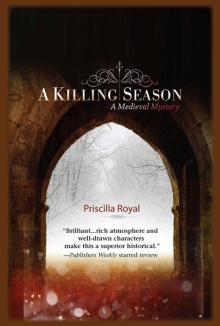 A Killing Season mm-8
A Killing Season mm-8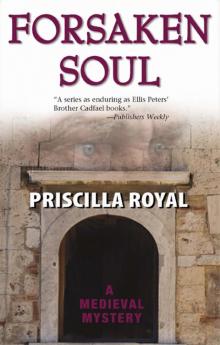 Forsaken Soul mm-5
Forsaken Soul mm-5 Valley of Dry Bones mm-7
Valley of Dry Bones mm-7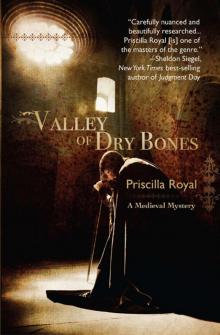 Valley of Dry Bones
Valley of Dry Bones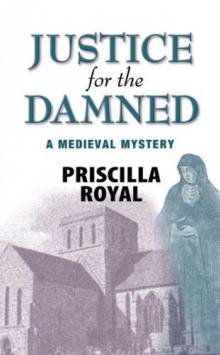 Justice for the Damned mm-4
Justice for the Damned mm-4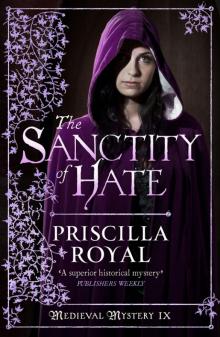 Sanctity of Hate
Sanctity of Hate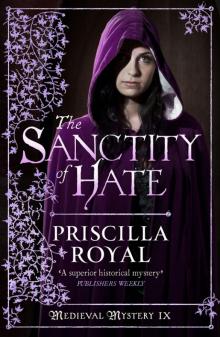 Sanctity of Hate mm-9
Sanctity of Hate mm-9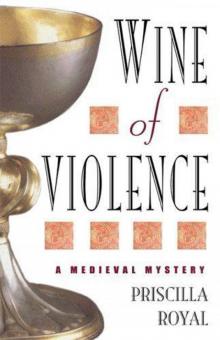 Wine of Violence mm-1
Wine of Violence mm-1